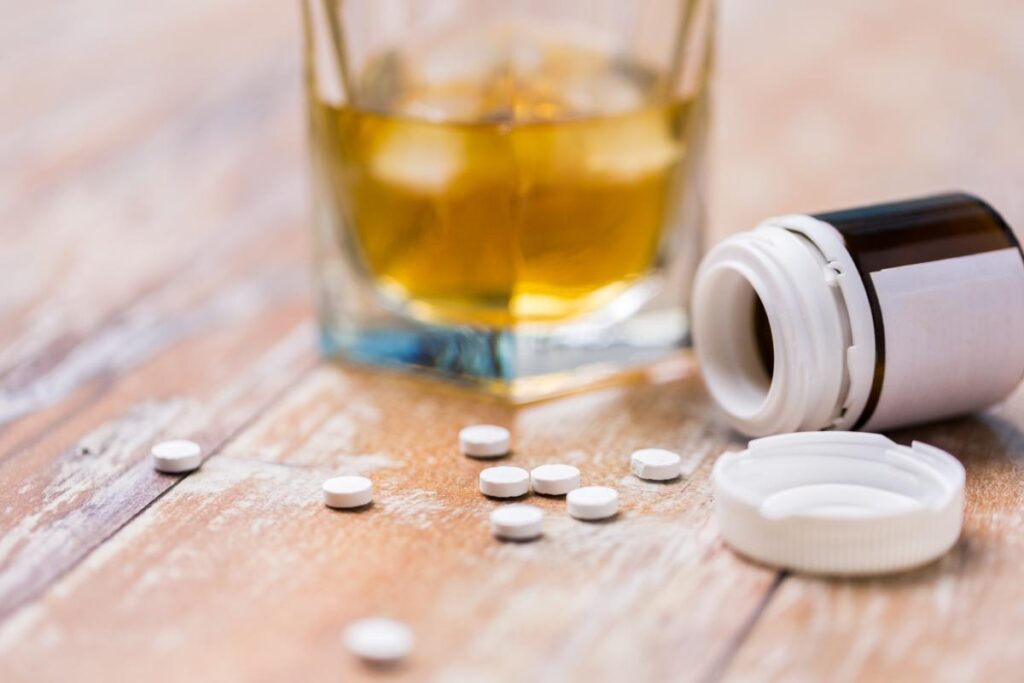Self-medication happens when someone uses substances like drugs or alcohol to manage distressing physical or mental health symptoms, without a prescription or medical guidance. In fact, alcohol is one of the most frequently abused substances in self-medication, and it can quickly lead to dependence and addiction. As a result, treatment at an alcohol detox center may be a necessary step toward healthy symptom management.
Need more information about an alcohol detox program? Call us today at 844.334.4727.
Coping With Depression by Abusing Substances
Though not everyone who self-medicates has been diagnosed with a physical and mental health condition, many people abuse alcohol as a way of coping with depression.
Drinking can temporarily make someone feel more relaxed and euphoric (or at least numb to whatever is distressing them). These feelings then provide short-term relief from the sadness and despair that depression can cause. Someone who self-medicates may get into the habit of drinking to avoid negative emotions or stressful situations. Since alcohol is widely available socially, they may not even realize they’re self-medicating.
People with depression and other mental health conditions are especially at risk for self-medicating with alcohol. Up to 25% of people with mood disorders have used alcohol or other drugs to cope.
Other reasons people might self-medicate with alcohol include:
- Physical pain from an illness or injury
- Post-traumatic stress disorder (PTSD) symptoms
- Sleep disorders like insomnia
- Upsetting events like divorce or death of a loved one
The Physical Risks of Self-Medicating With Alcohol
Self-medication isn’t addiction itself, but it increases the risk of developing an addiction. When a person keeps drinking despite multiple problems caused by their substance use, or has trouble controlling how much they drink, they may have an addiction or alcohol use disorder.
Heavy drinking raises the likelihood of developing health problems like:
- High blood pressure
- Some cancers
- Cirrhosis, hepatitis, and other liver diseases
- Strokes
- Pancreatitis
Self-medicating with alcohol can damage health in more immediate ways. Someone who drinks as a method for coping with depression or another health condition may delay getting essential medical or mental health help. And if people use drugs along with alcohol, even if they’re taking prescribed medications, the mixed substances may create dangerous interactions and side effects.
Can Alcohol Make Mental Health Conditions Worse?
Alcohol can make people feel better on a very temporary basis. However, alcohol is a depressant, and eventually it worsens symptoms of mental health disorders.
People who self-medicate with alcohol may find they don’t sleep as well, they have less energy, and they’re in a depressed mood more frequently.
These effects may trap people in a dangerous spiral where they increase their substance use to cope with unwanted emotions. Substance abuse will then increase their feelings of stress, hopelessness, or anxiety.
Long-term periods of dependence on alcohol can change the way the brain works. A person’s brain may become reliant on alcohol to function properly, or require larger amounts to achieve the same effect. In extreme cases, heavy drinking can even cause someone to develop a new mood disorder.
Springfield Wellness Center Offers Help and Hope
If you or someone you love is stuck in a pattern of self-medicating with alcohol, whether you’re coping with depression, handling chronic pain, or trying to avoid the stresses of daily life, it’s never too late to make a positive change.
The alcohol detox program offered at Springfield Wellness Center provides medical support and monitoring. If you experience withdrawal symptoms, trained doctors are there to help. After detox, you can begin the process of learning healthier coping mechanisms through depression treatment, therapy, counseling, and other aspects of recovery.
Our pioneering BR+ NAD treatment combines counseling and medication for people who are detoxing from alcohol and other addictive substances. The coenzyme NAD+ is essential for healthy functioning, and heavy drinking depletes the levels of NAD+ in the body. Fortunately, NAD+ treatment helps you recover in body and mind.
Ready to break the cycle? Reach out to us at 844.334.4727 or online today.


